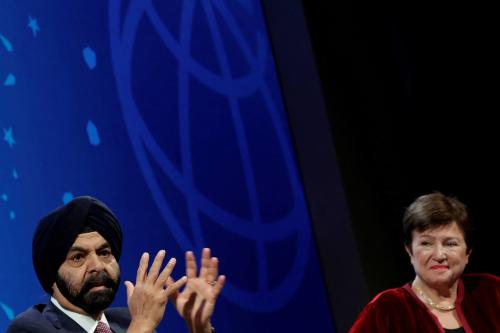European leaders finally decided to take political ownership of the Greek debt crisis last week, but not before it nearly spread to other countries in the euro area. In fact, Portugal’s public debt obligations had been downgraded just last Wednesday, only a day before European leaders announced their agreement.
Under the terms of the agreement reached by EU leaders, member countries from the euro area will provide financial support to Greece should the country be unable to roll over its public debt on financial markets. Thus, the euro area package is intended to complement rather than substitute market discipline, as the EU Commission president has promptly underscored.
Provisions for financial support would hinge on a unanimous decision by all euro area members, which gives Germany a de facto veto right. Last but not least, the IMF will provide one-third of the financial package.
Open Issues
There remains however a number of unresolved issues in the agreement, or, rather, what was disclosed of it. For example:
- The conditionality of any financial package to Greece will apparently be established by the European Central Bank and the European Commission, as many European sources have emphasized. This leaves the question of what practical role the IMF will have in designing and directly tracking the implementation of any conditions. The IMF, however, cannot allow disbursements upon the certification of another institution that the prescribed policy measures have been implemented.
- IMF program design typically includes measures regarding monetary and exchange rate policies. But Greece has no significant leverage where these policies are concerned, belonging as it does to a monetary union.
- The overall envelope on which euro area leaders have agreed has not been released. Perhaps this simply means that broad agreement has been reached on the parameters of a possible financial intervention, including the determination of specific amounts, even though the latter have not been disclosed. But is that truly the case? A figure circulated by Reuters soon after the summit mentioned an amount in the neighborhood of 20 billion euros. If that were correct, it would barely allow Greece to guarantee the refinancing of its debt until the end of May.
Winners and Losers
When all is said and done, the Greek crisis is likely to leave a bitter taste in the mouths of everyone involved. The Greeks will have to bear the humiliation of some European policymakers’ suggestions that they leave the euro area. The Germans will have to admit that their control on the single currency is more tenuous than they thought. In all likelihood, we may see a revival of a north-south dichotomy in Europe that decades of integrationist policies have kept at bay.
But more deeply than all that, the Greek crisis has highlighted fundamental weaknesses in the institutional design behind the European single currency. How can anyone be sure that member countries will enact policies consistent with their commitments? The response of the EU treaties has been to set up an EU surveillance mechanism to foster a convergence of the policy process among euro area participants. Ultimately, the mechanism failed, because, like other surveillance mechanisms, most notably that of the IMF, surveillance carries no leverage unless linked to a lending program. Therefore, the recent proposal to establish a European Monetary Fund would serve the distinct purpose of giving teeth to EU surveillance.
These recent events have reiterated that the Europeans have no shared view of what the political dimension of the euro should be, as reflected by their involvement of the IMF in a project as deeply political as the European economic and monetary union. Clearly, what was left of the integrationist drive has lost all momentum.
By calling in the IMF, the Europeans are also giving the impression that there is no real vision as to the role of the euro as a global currency. It would be like the U.S. asking the IMF for a package. True, the U.S. is a nation-state, while the euro area is a group of countries sharing a common currency, but this only underscores the fact that now many Europeans see the euro merely as representing a currency union, not as an intermediate step towards an “ever closer union.”
In the end, there is one clear winner here, namely the Managing Director of the IMF, who skillfully exploited European divisiveness and, against all odds, carved out an ever higher profile for the IMF in Europe.



Commentary
Greece, the EU Summit and the Future of the Euro
March 30, 2010